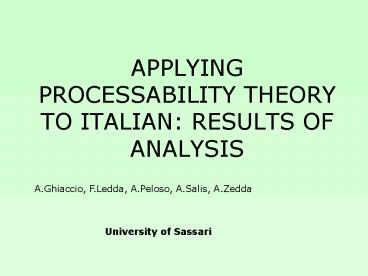APPLYING PROCESSABILITY THEORY TO ITALIAN: RESULTS OF ANALYSIS - PowerPoint PPT Presentation
1 / 36
Title:
APPLYING PROCESSABILITY THEORY TO ITALIAN: RESULTS OF ANALYSIS
Description:
APPLYING PROCESSABILITY THEORY TO ITALIAN: RESULTS OF ANALYSIS ... mangio, leggo. 2sg. mangi, leggi. 3sg. mangia. legge. 1pl. mangiamo. leggiamo. 2pl. mangiate leggete ... – PowerPoint PPT presentation
Number of Views:73
Avg rating:3.0/5.0
Title: APPLYING PROCESSABILITY THEORY TO ITALIAN: RESULTS OF ANALYSIS
1
APPLYING PROCESSABILITY THEORY TO ITALIAN
RESULTS OF ANALYSIS
A.Ghiaccio, F.Ledda, A.Peloso, A.Salis, A.Zedda
University of Sassari
2
Subjects 8 Erasmus students 2 untutored
learnersDesign longitudinal, 5-7 interviews
over 2-5 months Interviews semi-guided, with
free conversation and communicative tasks
3
Singular and plural forms for two inflectional
noun classes (-o/-i masculine -a/-e
feminine). Tavolo table Sedia chair.
4
Noun phrases Questo this Libro book
Grande big Sedia chair Molte many
5
regular Verb conjugationConjugation of two
regular verbs mangiare (eat) and leggere
(read), present tense. 3 conjugations, 6
persons, different moods, tenses and aspects
6
Data collection
7
3 criteria
- Data density absence vs non-suppliance
- Data uniformity all structures should have equal
opportunities to show that they are present and
productive - Data qualityfocus on communication vs focus on
grammar
8
Make sure that the learner produces
- morphological minimal pairs
- cane/cani
- complex noun phrases
- tavolo rosso/tavoli rossi
- full NP subjects
- Mario mangia
9
Types of tasks
- Notice the difference
- Describe images
- Two-picture stories
- Retelling of scenes taken from movies
- Information-gap tasks
10
Notice the difference
11
Two picture story
12
The happy farm
13
Liann 3, noun phrasesfree conversation
14
Notice the differencestreet with shops
15
Liann 3, noun phrases describe image street
with shops
16
II. Data organization
17
Liann, interview 1, category procedure
18
Liann, Int. 1, Cat.-proc TYPES AND TOKENS
19
Exclusion of problematic items formulas
- Category procedure
- Pantaloni, forbici (trousers, scissors)
- Ph- procedure
- Ristorante cinese, lanno scorso
- (chinese restaurant, last year)
- S- procedure
- Come-si-chiama, non-lo-so
- (how-do-you-say, I-dont-know)
20
Exclusion of problematic items null subjects
- Full subject
- Mario mangia (Mario eats) (almost certainly
productive) - Pronoun subject
- Io-mangio (I eat) (higher risk of
formulaicity) - Null subject
- Mangio (eat) (is this really
agreement?)
21
Factorisation
- looking at all phonological forms to see if
there is any systematic association between any
of them and any single diacritic feature
22
One form can be associated with different
functions
Plural?
-i
Masculine?
Masculine plural?
With some other features?
23
Data aggregation
- -i/-e
- As allomorphs for plural,
- Regardless of nouns gender
24
emergence is applied to the following structures
25
III. Data interpretation
26
Demonstrate productivity
27
Liann, int.1 Category-proc
28
Demonstrate non randomness
- Binomial retrocumulated formula
- applied to category procedure
29
Example
p probability of random agreement
2 alternatives right/wrong (more
conservative) 4 alternatives all possible
suffixes (more generous)
30
IV. Results
31
THREE INFORMANTS
- Liann
- Anita
- Swan
32
LIANN
- L1 irish
- Type of learner semi-tutored
33
ANITA
- L1 norwegian
- Type of learner tutored
34
SWAN
- L1 french
- Type of learner tutored
35
APPLYING PROCESSABILITY THEORY TO ITALIAN
RESULTS OF ANALYSIS
A.Ghiaccio, F.Ledda, A.Peloso, A.Salis, A.Zedda
University of Sassari
36
Visit our web site atwww.uniss.it/facolta/ling
ue/docenti/pallotti
- Includes
- Elicitation materials
- Interviews transcriptions
- Distributional tables

